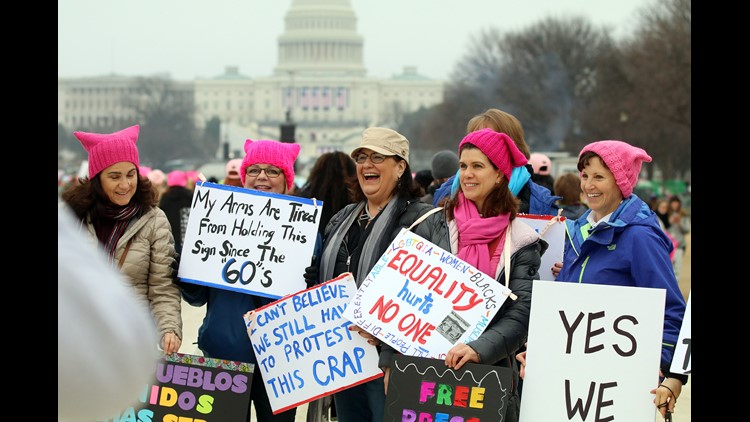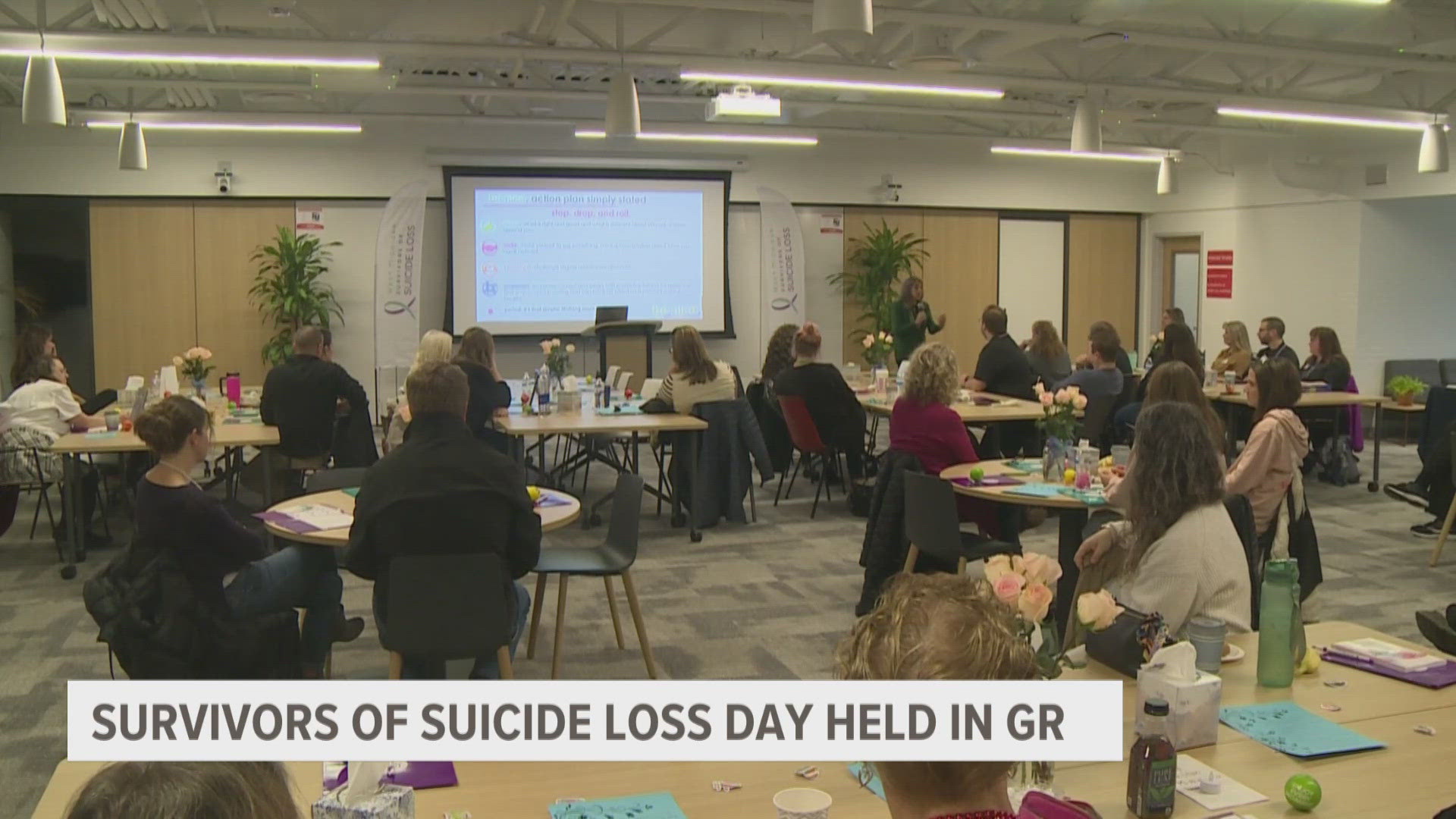WASHINGTON — The Women's March on Washington opened Saturday with impassioned calls to resist President Trump's agenda, as thousands massed to offer a loud rebuttal to his inauguration as the 45th president.
"A platform of hate and division assumed power yesterday," actress and activist America Ferrera told marchers. "But the president is not America. His cabinet is not America. Congress is not America. We are America!"
Feminist icon Gloria Steinem, gesturing over the crowd, said the gathering demonstrated "the upside of the downside."
"This is an outpouring of energy and true democracy like I have never seen in my very long life," she said.
Earlier in the day, the Associated Press reported that due to the massive turnout at the event, organizers couldn't lead a formal march toward the White House. The AP cited a District of Columbia official, speaking on condition of anonymity because the official isn't authorized to speak for the march.
But the march is continued despite reports to the contrary.
The official map for the Women's March:
It's finally here! Check out our March Map and remember to print it out and save it to your phone. #WomensMarch pic.twitter.com/LwMNx674ss
— Women's March (@womensmarch) January 20, 2017
Organizers of Saturday's Women’s March on Washington have expected it will take its place among historic marches that led to movements — including the 1963 civil rights demonstrations and the Vietnam War protests of 1967.
On Saturday morning, a city official in Washington said the turnout estimate had grown to 500,000 — more than double the 200,000 people that organizers initially expected to attend.
Attendees aren't organized by a single group. They’re coming on their own — aboard buses and trains from locations as distant as Colorado’s Rocky Mountains — after Hawaii grandmother Teresa Shook created a Facebook page following November's election.
PHOTOS: Protest signs from Women's March
“We will witness one of the largest and most significant demonstrations for social justice in America’s 240-year history,” said Crystal Hoyt, an associate dean at the University of Richmond who focuses on women and minority leaders. “By stoking and exploiting fear, Trump mobilized deep-seated sexism, racism, and xenophobia to gain political traction,” she said.
According to the event website Eventbrite, roughly 875,000 people plan to participate in more than 350 marches and rallies this weekend around the country. The largest is expected to be the main D.C. march on Saturday.
By comparison, 200,000 people attended the March on Washington in 1963. A 1967 march on the Pentagon protesting Vietnam drew 100,000.
Hillary Clinton, who loss to Trump helped inspire the march, weighed in via Twitter before the event.
"Thanks for standing, speaking and marching our values," she wrote.
Thanks for standing, speaking & marching for our values @womensmarch. Important as ever. I truly believe we're always Stronger Together.
— Hillary Clinton (@HillaryClinton) January 21, 2017
Hours before the event began, people were streaming into the city, many wearing bright pink hats and wielding signs with messages such as "The future is female" and "Less fear more love."
Rena Wilson, of Charlotte,' North Carolina, said she hopes the women can send Trump a message that they're "not going anywhere."
Joy Rodriguez, of Miami, arrived with her husband, William, and their two daughters, ages 12 and 10. "I want to make sure their rights are not infringed on in these years coming up," Joy Rodriguez said.
The Washington subway system was jammed Saturday morning with women wearing pink-themed clothing and trading stories about overnight bus rides. Overflowing Metro passenger trains passed platforms crowded with more people who were unable to board. The crowds of women and men of all ages stand in contrast to the protesters around the inaugural, who were mostly young people.
The women had diverse concerns about Trump.
“There’s a lot of people who care about the lies he’s told,” said Laurie Gentry, a 60-year-old who took a
n overnight bus from Greenville, S.C. She cited climate change, education and marriage equality.
Photos from Shady Grove #METRO station this morning. @wusa9 #womensmarch pic.twitter.com/6Rheo0WDyl
— Ellen Bryan (@_EllenBryan) January 21, 2017
Friday night, a packed 56-passenger bus departed from Louisville, Ky., ferrying women ranging in age from 7 to 80 years old.
"This election was the first time I really felt like something in me was awakened and stirred," said Robin Weiss, a 45-year-old mother of nine accompanied by her 16-year-old daughter. "This was the first time it really felt like I had nothing," she said. "I'm showing my daughter I'm willing to put my money where my mouth is," said Weiss.
"I‘m aghast, and it obviously prompted me to get myself up and get to Washington. I’m not just doing it for myself but I’m doing it for my daughters and granddaughters," said Wendy Hames, a 67-year-old retired school teacher who took a sleeping pill to weather the overnight haul.
Their bus, like many traveling to DC via the bus crowdsourcing company Skidaddle, will make its 9-hour return right after the march; but its passengers say the sleep loss is worth it. "I learned from the Vietnam War that you have to raise your voice" and "I represent a lot of women who couldn't make it," said Hames.
What’s unique is the march's global reach, with at least 673 “sister marches” planned in locales as far away as Hawaii and California domestically and from New Zealand to Belarus, Ghana and Riyadh, Saudi Arabia. With the fortunes of so many nations, particularly in the Western world, tied to the U.S., it’s become an international event.
The main organizers of the D.C. march say their message is not anti-Trump, yet a feeling that their rights are at risk under the new regime in Washington is clear.
Psychologist and author Anita Mishook sees parallels between the concerns of today’s women and the cultural restrictions put on their grandmothers and great-grandmothers, specifically over reproductive rights, including abortion and affordable contraception. “Back street abortions, untimely marriages, huge families. Let us not have it happen again!" she said.
The marches' many partners represent a range of causes, including the environment and criminal justice among them. Organizers represent all 50 states, and groups including the ACLU, Amnesty International, EMILY’s List, Muslim Women’s Alliance, Planned Parenthood, and United We Dream.
"The March is a statement of solidarity affirming our shared humanity and fundamental human rights," the organizers said in a statement.
Aside from the new president's ability to appoint Supreme Court justices who could seek to overturn the decision in 1973 that established a woman’s right to abortion, Roe v Wade, marchers see other things that could happen more immediately. This includes Congress rolling back funding for Planned Parenthood, which provides free breast cancer screening and health services. U.S. House Speaker Paul Ryan has vowed to cut the group's funding as part of repealing Obamacare. The same could well happen with contraception coverage provided under the Affordable Care Act, as well as access to mammograms with no co-pay or deductible. Since more women receive Medicare than men, changes to the program would disproportionately hurt them.
“We will not be silent as elected officials attempt to roll back our rights,” said Teresa Younger, president of the Ms. Foundation for Women. In a tribute to Hillary Clinton, the nation’s first female to represent a major party, the march's official motto is “Women’s rights are human rights,” the 1995 declaration Clinton made as first lady in Beijing.
The march is about more than a single day of protest. A number of groups, including EMILY’s List and Planned Parenthood, are holding workshops the following day designed to enlist women for more civic participation back home, including running for office.
Among the speakers: Cecile Richards, president of Planned Parenthood; Sister Simone Campbell, a Roman Catholic activist who led the "Nuns on the Bus," feminist icon Gloria Steinem as well as Hollywood actors including Ashley Judd and Scarlett Johansson.
There have been questions around the march. A pro-life women’s group “And Then There Were None,” is holding a separate event after it says its partnership in the main event was revoked. Also the show of unity belies the fact that 54% of white women voted for Trump despite his rhetoric about women, including bragging about sexual assault.
Contributing: The Associated Press



